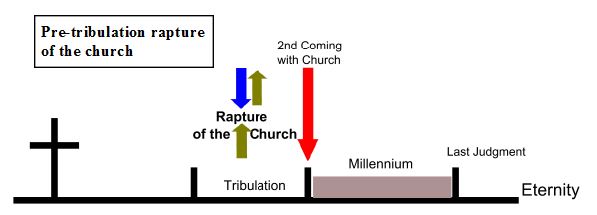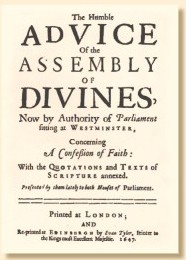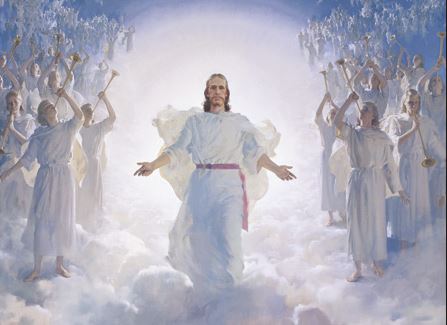 Related Articles
Related Articles
|
|
|
 Websites
Websites
|
|
|
|
|
Covenant Theology and Dispensationalism
Two contradictory and competing 'systematic theologies' have been, and remain very influential in shaping Christian belief and action.
 Note: The 'response' facility relating to this article is available to (logged on) site members only. Note: The 'response' facility relating to this article is available to (logged on) site members only.
Preface
The following article is a modified extract from an earlier article entitled 'A Covenant-keeping God'. The piece, which contains an overview of the major Biblical covenants, is itself part of a 'Drilling Down' series of articles (a 'work in progress').
-----------------------
Foreword:
Theological constructs;
frameworks of interpretation
(aka Systematic Theology)
REGARDING interpretational systems and frameworks or – to use the fancy term – hermeneutics, it is important to note the distinction between terms which are ‘theological’ and those which are ‘biblical’. Theological terms need to be treated with great caution.
Whilst these might be convenient in the discussion of key biblical themes and concepts (e.g. the term ‘Trinity’ as used in reference to the triune Godhead) these are essentially – in the grand sweep of history – neologisms.
They are essentially religious rather than biblical terms or, to use another word, ‘inventions’. They are often lacking clear definition and, across the Christian spectrum, experience differing levels of (dis)agreement and common understanding.
An example is the word ‘sacrament’. It is not found in the Bible and theologians have differed regarding the precise nature of a ‘sacrament’ and also what is (and isn’t ) covered by the term. (See New World Encyclopedia on the subject.) And the different opinions are not confined to the clichéd Roman Catholic/Protestant divisions. The Reformers Luther and Zwingli were famously in disagreement over Communion.
It is also important to differentiate between inductive learning and deductive reasoning. The former derives a view directly from (out of and formed by) the Bible text (exegesis): the latter is arrived at by a process of logic. For instance (and only for the sake of illustration) if it is held that God predestines some to salvation, then logic should dictate that God must, by extension, predestine some to a lost eternity. The use of logic can produce doctrines that are arrived at by eisegesis (reading into a Bible text from a particular and pre-suppositional theological framework).
Clever murder mysteries use 'deduction' to lead the reader or viewer on a false trail and to suspect the wrong person of the crime. (But of course Hercule Poirot's incisive and 'out-of-the-box' thinking shames the logic of we armchair sleuths every time.)
This is not to detract from the benefits of Systematic Theology which (in plainer language) is merely a themed approach to Bible study, but rather to highlight that theological suppositions should never be placed on a par with or, infinitely worse still, sit above the Word of God.
------------
Introduction
Two major theological systems -
(which contradict each other whilst also failing the Berean test: Acts 17:10-11).
 Caveat: Whilst focusing on particular interpretations, this is an 'equal opportunities' document in that it offers scope for a variety of opinions right across the theological spectrum. Caveat: Whilst focusing on particular interpretations, this is an 'equal opportunities' document in that it offers scope for a variety of opinions right across the theological spectrum.
In the Christian community across the world there are a variety of theological positions. However two of these have gained widespread support and – whilst disagreeing with one another – have both been highly influential in the formulation of belief. And it is important to stress again that these are theological constructs. The earliest of the two has been termed ‘Covenant Theology’ (mainly formulated and codified in the 17th century; see Footnote): the other being ‘Dispensationalism’ (with its origins in the 19th century).
The former is a central plank within Presbyterian churches around the world and across the (Presbyterian) denominational spectrum. The latter originated in the UK (pioneered by those within what became the Plymouth Brethren), but crossed the Atlantic to become hugely influential in the late 19th century. Dispensationalism informed the belief of the pentecostal churches at the start of the 20th century and has, since then, expanded both denominationally and geographically.
Covenant Theology

Covenant Theology (CT) developed two principal terms to describe its dual covenant interpretational framework viz. a Covenant of Works and a Covenant of Grace. (Some argue that there is only one covenant – the Covenant of Grace. Others include a Covenant of Redemption between the Father and the Son.) These theological terms have been employed to develop a whole range of doctrines and, because of the influence that they have had, we will (d.v.) come back to these later in more detail.
However, for the moment, and with reference to the most common 'dual-covenant' view – developed first by Dudley Fenner, an English Puritan, in 1585; and then Scottish theologian Robert Rollock (1555 - 1598) – it is sufficient to say that the (theological) Covenant of Works is used to denote the period prior to the Fall in the Garden of Eden. In simple terms the Covenant of Works would say: “If Adam and Eve had obeyed the instructions given to them then they would have been OK. “ However Adam and Eve didn’t, so God had to embark on Plan B – the Covenant of Grace.”
This term – again simply speaking, but remembering that it is a theological expression, not a biblical, one – covers the continuous period from the Fall until the final consummation and Kingdom come.
However this span of time is (it is argued) should be split into two ‘administrations’ (again a non-biblical term); basically delineated by the Old Testament (OT) and the New Testament (NT) periods. In these two ‘administrations’ (it is said) God applied the same principles but in two different situations and in two different ways to the one people of God. These were Israelites in the OT and believers (Gentile and Jewish) in NT times.
Whilst this is a convenient hermeneutic, it is not biblical. The nation of Israel was in effect a theocracy within which some were in communion with God (cf Heb. 11) while others very obviously, were not. In contrast the church (in the true sense of the bride of Christ) comprises solely of people in blood-bought communion with God.
So 'OT Israel = OT expression of church' is both overly-simplistic and grossly misleading . As a corollary, 'Church = Israel' is also untrue. (More on this below.) But as Covenant Theology has been widely accepted as ‘biblical’ it has led directly to (for instance) infant baptism. Accordingly paedobaptism is claimed to be the NT equivalent of circumcision – even though circumcision was never the symbol of salvation and union with God; and was only ever applied to males. [Again, more on this at later date (d.v.) when looking at 'Who are Abraham's seed?']
One of the other principal, and even more serious, mistakes deriving from Covenant Theology has led to what is commonly called ‘Replacement Theology’. This ‘theology’ – also termed Supercessionism – teaches that the Jews have now been ‘replaced’ by the mainly-Gentile church and (therefore, by deduction and logic) the promises to the Jews have now either all been fulfilled or spiritualised; or will find any contemporary or future fulfillment in the church. (So for instance many older Bibles have chapter headings for Isaiah 59 as “God’s curses on the Jews” and Isaiah 60 as “God’s blessings on the Church”.)
The ‘replacement’ view is most emphatically rejected by Paul in his letter to the (Jewish and Gentile) church at Rome. In fact this is his core message (Rom 11:1-2; 11-12) and the underlying reason for writing this – his longest – letter.
Dispensationalism

In contrast to Covenant Theology the other system of interpretation that has attracted widespread support is that of Dispensationalism.
There is a view that Dispensationalism (as distinct from, but embracing pre-millennialism) has its genesis in a Scottish believer (Margaret Macdonald; 1815-1840) and a Church of Scotland minister (Rev. Edward Irving; 1792-1834). What is undisputed is the fact the John Nelson Darby (founder of the Plymouth Brethren as a distinct grouping with its roots in the wider Brethren movement) is the latter-day father of this theological system. Darby took his pre-tribulation rapture teachings (the removal of believers from the earth prior to the return of Christ and before the ‘great tribulation’ of Matt. 24) to America where they were enthusiastically embraced by a lawyer called Cyrus I. Scofield (1843-1921).
Scofield in turn produced the Scofield Reference Bible (first published 1909) which is annotated throughout in support of Darby’s interpretations – especially with reference to eschatology, the end-time prophecies and events regarding Christ’s return. The Scofield Bible has been hugely influential right through to the present day – in America and right around the world. The teachings are now being propagated through the Moody Bible Institute in Chicago, Dallas Theological Seminary, and more than 200 other lesser-known Bible institutes..
Dispensationalism divides history into sections, covering the periods of Innocence, Conscience, Civil Government, the Patriarchs, the Law, Grace (the church age), the Millennium and the final consummation leading to the everlasting kingdom. However, and perhaps because this theological system lacks biblical warrant, there is a range of opinions (disagreement) on how many dispensations there are (varying from three to eight) and where, in history and in Scripture, the dividing lines lie.
But irrespective of the number of dispensations, the agreed assumption is that God has dealt differently with his world and its people in each of these different dispensations. Accordingly then, a different hermeneutic needs to be applied to the different portions of Scripture which cover these different periods of time.
What is also generally agreed is that the church age is a parenthesis – a defined interlude – in God’s overall plan of salvation i.e. in the OT God is dealing through the Jews while the NT is the time of the Gentile church until Jesus’s rapture of the saints (with a pre/post/mid-Tribulation rapture range of views) . This will usher in a further period of God again dealing with and through the Jews.
Dispensational teaching has been greatly popularised and adopted through hugely-influential and best-selling books like Hal Lindsey’s ‘The Late Great Planet Earth’ (1970) and the ‘Left Behind’ series of novels by Tim LaHaye. The Left Behind books – the first in the series appeared in 1995 – have sold over 50 million copies, and have been turned into a cinema production. The books are freely available from and often prominently displayed in Christian bookshops.
As stated earlier, the core element of these novels is the ‘pre-tribulation rapture’ which, as already stated, teaches that all Christians will be suddenly and without any warning removed from the earth prior to the return of Christ. (See Footnotes.) However, and apart from the wider Christian community, even within the Brethren camp there was disagreement. George Mueller (of Bristol Orphanage fame) broke with Darby over this issue. The great Baptist preacher C.H. Spurgeon also declared the teaching to be unscriptural. Nevertheless the doctrine has persisted.
In summation...
Both Covenant Theology and Dispensationalism have been and continue to be highly influential in formulating Christian belief, but both are disputed.
Covenant Theology dismisses swathes of end-time prophecy as irrelevant or allegorical, and sees no place in God’s final purposes for the Jews other than (perhaps) a final ingathering as outlined in Romans. In terms of latter-day expectations prior to the return of Jesus, the former implicitly teaches a universally positive response to the Gospel (reading more into Matt. 24:14 than the verse allows; cf Matt 7:14).
Meanwhile, though recognising the prophesied 'time of great trouble' (Dan 12:1; Matt 24; 2 Tim. 3:1-12), Dispensationalism (in pre-tribulation rapture form), teaches that believers will be spirited away, leaving the Jews to face the music of Satan’s final onslaught. (See Footnotes.)
So while the Gentile believers look down from a safe vantage point in heaven (as God's 'heavenly people'), the Jews will be God's latter-day 'earthly people' who will suffer greatly but endure through the Great Tribulation. Within the Dispensationalist view, Matthew 24 (et al) and, for some, Revelation chapters 4 - 19 are seen as only of academic interest – given the belief that the Gentile saints will be in heaven during that period.
Regarding God’s end-time purposes for the Jews, Dispensational Theology cannot get the church and Israel together, whereas Covenant Theology cannot get the church and Israel apart. The former sees the Jews and the church as totally different entities separated by ethnicity and end-time progression, whereas the latter see Israel and the Jews as essentially an earlier expression of the church, differentiated only by two separate and distinct ‘administrations’ of time (OT/NT) in God’s grace. In fact Israel was/is a physical nation comprising the saved and the lost (Rom 9:7), whereas followers of Christ are a spiritual nation made up exclusively of the redeemed (Gal 3:7,8; 1 Pet 2:9).
At the very least it can be confidently stated that because these two systems disagree markedly with one another, they cannot both be completely right. (And it could be argued that in critical issues they are both wrong.) Yet both of these systems have created expectations and assumptions which could leave believers scripturally askew; vulnerable through false hopes; and ill-prepared to understand the times and the purposes of God in our day as the cosmic upheavals preceding Kingdom Come drawn ever nearer.
At the risk of vain repetition, the theological systems of Covenant Theology and Dispensationalism lack Biblical support in major areas of doctrine, theology and eschatology. Moreover they profoundly disagree with each other on very significant points – especially concerning the times preceding the coming again of Christ; the place of, and God’s purposes for the Jewish people; and the establishment of His everlasting kingdom.
Footnotes:
1. Pre-Tribulation Rapture of the church as taught by most Dispensationalists. The view held is that Christ will have two comings: the first will be invisible 'for the saints' and the second 'with the saints'.

-------------------
 2. The Westminister Confession of Faith (1644) codifies much of what is described as 'Calvinism' and is subscribed to as a 'Subordinate Standard' by Presbyterian denominations worldwide. 2. The Westminister Confession of Faith (1644) codifies much of what is described as 'Calvinism' and is subscribed to as a 'Subordinate Standard' by Presbyterian denominations worldwide.
The document is predicated on so-called 'Covenant Theology' and contains material which is, in the broad sweep of the formulation Biblical, extra-biblical, and unbiblical representing Truth mixed with error.
It is also deficient in failing to cover some some major biblical themes: making bare mention of the person and role of the Holy Spirit, and with no mention of the Great Commission.
3. The Millennium
 Broadly speaking Reformed (Covenant) theology teaches the Millennium as being a definite period prior to the coming again of Christ at the end of the age. However, the early church believed in a literal Millennial reign of Christ on earth. Broadly speaking Reformed (Covenant) theology teaches the Millennium as being a definite period prior to the coming again of Christ at the end of the age. However, the early church believed in a literal Millennial reign of Christ on earth.
While many today share this latter view, not all who do are Dispensationlists (i.e. all Dispensationlists are pre-millennial but not all Pre-Millennialists adhere to Dispensationalism). See article The (Coming) Millennium by a Scottish lay preacher and city mission superintendent. |
The Editor, 30/07/2013
|
(page
1
2
3
4
5
6
7
8
9
10
11
12
13)
| |
|
Colin Ford (Guest) |
09/08/2013 20:03 |
John,
May I ask you to reconsider what you assert?:
"Paul was not expecting an imminent rapture is a denial of what he writes himself in a simple, plain statement,"We the living who remain"."
Immediately preceding that "plain statement", are the words "For this we say unto you by the word of the Lord" 1 Thessalonians 4.15. This was Paul speaking God's very Word, he was reassuring them that their dead loved ones who were believers would not be disadvantaged, when the Lord comes; they would rise first.
So therefore when the Lord does come the dead will rise first, then "we who the living who remain" will be caught up. I believe this!
I will quote Hogg & Vine (NT Greek Scholars) from their exposition on 1 Thessalonians 4.15, page 138, (They WERE pre trib theologians);
"It seems clear, therefore that no conclusion can be drawn from the Apostle's language as to his personal expectations.
He shared in what should be the attitude of each generation of Christians, the desire for the Parousia of the Lord Jesus.
Neither apparently, can any development in his doctrine be traced in his epistles., read chronologically; much less is there any evidence is the later are intended to correct the earlier. Indeed, these words to the Thessalonians claim to be a revelation from the Lord Himself, and while they might be expanded or explained by later revelation, they could not be set aside, much less could they be attributed to a mistaken apprehension on the part of the Apostle.
The Apostle throughout his life, as his epistles reflect it, maintains the same attitude toward the great alternatives. There is neither contradiction or inconsistency. His example and his words alike teach us to be prepared to meet death with unflinching courage, but above all things to look for the Parousia of the Lord.
The use of 'we' and 'us' in Psalm 66.6, Hosea 12.4, Romans 13.11 and Romans 13.13 may be compared.
That are left-perileipo, literally 'those who are left over;'this word which occurs again in verse 17 is intended to define what the Apostle meant by the "living". These were not necessarily the then living."
As I have said above, Hogg and Vine were Dispensational theologians and believed in the doctrine of imminence, yet they taught that "no conclusion from the Apostle's language as to his personal expectations" could be drawn?
|
| |
|
John Ferguson (Guest) |
09/08/2013 21:37 |
Because Peter was told he would doesn't disprove the imminence of the rapture or Paul
expecting to die indeed but Paul does say we the liiving and remain until th coming of The Lord will be caught to meet The Lord in the air.
I agree with you as regards Israel being restored to the land .The man of sin will be revealed before the Day of The Lord but the rapture precedes the Day of theLord by seven years.My understanding is that the second comming is int two stages first the rapture in the air,then Christ return when his feat shall stand upon the mount of olives
Zechariah 14 v4
As for predicting who the Man of sin is I have no agreement with what is awash on the Internet
I have no idea who the Antichrist is nor would sugestt who he might.be.
I do believe the church will not go through the tribulation Rev 4v10
|
| |
|
John Ferguson (Guest) |
09/08/2013 21:47 |
Forgot to address my last post to Colin
|
| |
|
John Miller |
10/08/2013 09:22 |
John I agree entirely with your remarks about the restoration of Israel, God's earthly people and the only nation on earth to be named as such. His covenant with Abraham remains. The man of sin will emerge at a time appointed by God as will the Antichrist.
The Lord clearly taught that he would keep His own out of the great tribulation.
I am at a loss to understand Colin's denial of the truth of Paul's simple, clear statement in 1 Thessalonians in which he shows his expectation of being alive when The Lord would return to take those who belong to Him out of this world. Great servant that he was he did not have any idea of God's timing, when the Master of the house would shut the door of grace.
Colin quotes various commentators etc., but I prefer to believe the Spirit inspired words of scripture. No future event that involves the Lord's people is so clearly described in scripture.
|
| |
|
John Miller |
10/08/2013 09:39 |
Colin I have been thinking about your previous reference to the wise and foolish virgins. The thrust of this parable is contrary to your theories denying the imminence and suddenness of the Lord's coming FOR his own.
Some had prepared for it and the oil surely refers to the possession of the Holy Spirit. Others, perhaps in the profession were not true believers and were unprepared.
The Bridegroom comes, those who were ready were taken, those who merely professed were left and denied entrance to the celebration. They were left behind.
By the way, your sarcastic reference to the saints of God having a party up in heaven was uncalled for and unworthy of this discussion. The prospect of being with Christ is the most glorious hope of the believer and to refer to it in this way is degrading.
"When we see Him we shall be like Him, for we shall see Him as He is".
|
| |
|
Derek (Guest) |
10/08/2013 10:17 |
"We talk of the Second Coming; half the world has never heard of the first." — Oswald J. Smith
|
| |
|
John Miller |
10/08/2013 10:40 |
Derek he was undoubtedly a man of God. However since he made that very remarkable statement methods of international communication have expanded most dramatically. There will be few corners of the present day world where the name of Jesus by some means or other will not have been spoken.
The Internet, although the carrier of much evil like every other man made media form, also takes the Gospel to the remotest outposts of human society.
|
| |
|
Colin Ford (Guest) |
10/08/2013 12:12 |
John,
Regards your last post, I agree with what you assert, but from a post tribulational stand point! The wise virgins will be ready. The Lord will come suddenly and unexpectedly, but please, please tell me where the imminence is?
That comment of mine about the "party up in heaven" perhaps was lacking in grace somewhat, but in no way was it meant to be sarcastic. But anyway it amounts to the same thing? The word "party" is not an abusive or a swear word?
To accuse me of a "denial of Paul's simple clear statement", does indeed beggar belief!
"we who still live and remain" has two present tense participles. But the present tense does not necessarily imply that that the actions take place in present time, as if Paul were speaking of those NOW alive and are NOW remaining; substantival present participles do not necessarily indicate an action that takes place at the time of the statement. Our translation restates what the Greek says, no more and no less.
Scholars have intended to over interpret Paul's use of the first person plural that is "WE who live and remain". There is sufficient evidence elsewhere that Paul did not expect to live until the parousia or that by implication, the parousia was near at hand. First, the Apostle faced death daily; even if a man of his age might expect to enjoy another twenty years of life , his lifestyle was by no means normal. With his constant encounters with near-fatal beatings, exposure, imprisonments in unhealthy conditions, malnutrition, bandits, shipwreck, and other threats to life (c/f 2 Corinthians 11.23-27), one should wonder how such a man could expect to see any future event, let alone Christ's return."
Page 184, Shogren's Exegetical Commentary on the New Testament.
Gary S Shogren PhD Kings College Aberdeen. He is a Greek scholar.
Regarding Bible Colleges, I certainly couldn't recommend one, from a theological standpoint as they tend to be theologically biased, but they are neutral in regards learning the Greek and Hebrew?
I think it would do us all well to take a good hard look at 2 Corinthians 11.23-27 again?
I believe Mr Ferguson meant to quote Revelation 3.10?
I would comment thus; If we read this verse aright, it tells us that God will "KEEP" us, NOT take us "from the hour of trial".
|
| |
|
John Miller |
10/08/2013 12:50 |
I understand Colin that Paul's clearly stated expectation at that time in his ministry is a problem for you. You are therefore trying to distort its plainly worded simplicity to accommodate your post tribulation rapture theory. In trying to further justify your position you now apply human reasoning as to why Paul could not have been expected to live until the Lord's return for His own.
Brother, just read Paul's words and accept the simple statement he makes as the truth of his expectation at the time of writing.
Your reference to Revelation 3:10 is good. It confirms the truth of a rapture before the great tribulation.
I'm not looking for a Bible College. At the age of 71, I don't have the inclination!
Every believer who truly believes the word of God is looking for the Lord's return until the article of death becomes their inevitable portion. Then they know that the first voice they hear, the first face they will see, the first One they will meet will be Jesus, and that on their way to glory.
|
| |
|
John Ferguson (Guest) |
10/08/2013 20:25 |
Colin
When Jesus returns with his saints Jude 14 who are they? If they are not the.raptured
church.
|
(page
1
2
3
4
5
6
7
8
9
10
11
12
13)
|
|
|